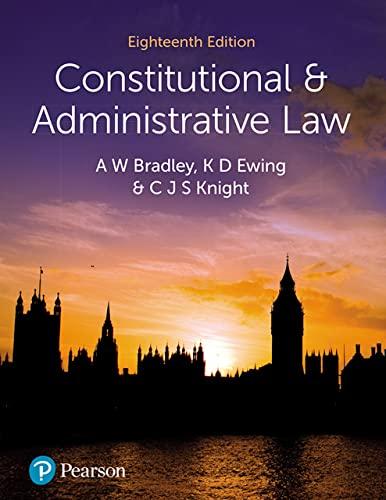Question
1. Benson is a professor of legal studies at UCLA.One night, he finished reading a 1,200 page book dealing with copyright issues that had just
1. Benson is a professor of legal studies at UCLA.One night, he finished reading a 1,200 page book dealing with copyright issues that had just been published. The topic of the book coincided with a topic he was discussing in class and he copied 3 pages of the book and distributed the copies to all of his students. One of Benson's student was a good friend of the author who wrote the 1,200 page book on copyright, informed him of what Benson had done, and he sued Benson for copyright infringement. What would be the result in this case? Please discuss.
2. Spahn conceived a secret process for the continuous freeze-drying of foodstuffs and related products and constructed a small pilot plant that practiced the process. However, Spahn lacked the financing necessary to develop the commercial potential of the process and, in hopes of obtaining a contract for its development and the payment of royalties, disclosed it in confidence to Donovan, a coffee manufacturer, who signed an agreement not to disclose it to anyone else. At the same time, Spahn signed an agreement not to disclose the process to any other person as long as Spahn and Donovan were considering a contract for its development. Upon Spahn's disclosure of the process, Donovan became extremely interested and offered to pay Spahn the sum of $1,750,000 if, upon further development, the process proved to be commercially feasible. While negotiations between Spahn and Donovan were in progress, Nelson, a competitor of Donovan, learned of the process and requested a disclosure from Spahn, who informed Nelson that the process could not be disclosed to anyone unless negotiations with Donovan were broken off. Nelson offered to pay Spahn $2,500,000 for the process, provided it met certain defined objective performance criteria. A contract was prepared and executed between Spahn and Nelson on this basis, without any prior disclosure of the process to Nelson. Upon the making of this contract, Spahn rejected Donovan's offer. The process was thereupon disclosed to Nelson, and demonstration runs of the pilot plant in the presence of Nelson representatives were conducted under varying conditions. After three weeks of observing experimental demonstrations, compiling data, and analyzing results, Nelson informed Spahn that the process did not meet the performance criteria in the contract and that for this reason Nelson was rejecting the process. Two years later, Nelson placed on the market freeze-dried coffee that resembled in color, appearance, and texture the product of Spahn's pilot plant. What are the rights of the parties? Please explain.
PreviousNext
Step by Step Solution
There are 3 Steps involved in it
Step: 1

Get Instant Access to Expert-Tailored Solutions
See step-by-step solutions with expert insights and AI powered tools for academic success
Step: 2

Step: 3

Ace Your Homework with AI
Get the answers you need in no time with our AI-driven, step-by-step assistance
Get Started


